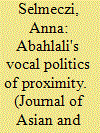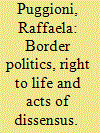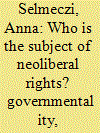| Srl | Item |
| 1 |
ID:
117769


|
|
|
|
|
| Publication |
2012.
|
| Summary/Abstract |
Using as its point of departure the claim that today the urban is the main site for the abandonment of superfluous people, this article explores the emancipatory politics of the South African shack-dwellers' movement, Abahlali baseMjondolo. Based on a notion of political subjectivization as the appropriation of excess freedom, I argue that Abahlali disrupt the order of the 'world-class city' when they expose the contradiction between the democratic inscriptions of equality and the lethal segmentation of the urban order. In articulating their living conditions as the unjustified breach of the promise of 'a better life', the shack-dwellers prove their equality and thus emerge as political subjects. As the article argues, at the centre of this process is a political practice of speaking and listening that is driven by the imperative to reverse the distancing and delaying practices of an order that abandons them by remaining physically, experientially and cognitively proximate to the experiences of life in the shantytown.
|
|
|
|
|
|
|
|
|
|
|
|
|
|
|
|
| 2 |
ID:
139770


|
|
|
|
|
| Summary/Abstract |
The debate on migration-related border controls has greatly expanded during the past decade. Special attention has been given to processes of contestation and of rights-claims enacted by migrants, drawing greatly on Isin’s work on acts of citizenship and Rancière’s articulation of the ‘uncounted’ and the political. Within this broad debate little attention has been devoted to the acts of common people in contesting current border management and especially in refusing the policing and the bordering of their own territory. By focusing on the Lampedusa borderland, this paper will explore and interrogate the verbal protests made by the people of Lampedusa in response to the drowning of some 366 African migrants on 3 October 2013. The protests were mostly against current border patrolling and its politics of (non-)life, which prioritise border protection against (migrants’) life protection. The call to protecting all human life, equally worthy of being protected, transformed these protests into political acts. Using and extending the work of Rancière, I explore the extent to which the people of Lampedusa have highlighted a ‘wrong’ and enacted ‘dissensus’ by contesting the (natural) securitised order of EU border management.
|
|
|
|
|
|
|
|
|
|
|
|
|
|
|
|
| 3 |
ID:
139766


|
|
|
|
|
| Summary/Abstract |
Motivated by the litigious politics of the South African shack-dwellers’ movement, Abahlali baseMjondolo, this paper enquires into the knowledge dynamics implied by the governmentality literature’s take on the (neo)liberal deployment of (human) rights. It suggests that by implicitly constructing the freedom of codified rights as illusionary and opposed to the reality of neoliberal rationalities of government, this scholarship posits a cognitive hierarchy between agents of government and the governed, and thus reproduces the power dynamics that it seeks to criticise. Interweaving a presentation of Abahlali’s self-articulation as knowledgeable and rightful subjects with Jacques Rancière’s notion of ‘literariness’, the paper accounts for codified rights’ potential to enable the disruption of such dynamics, and traces the governmentality literature’s suspicion towards this potential back to its textual methodology.
|
|
|
|
|
|
|
|
|
|
|
|
|
|
|
|